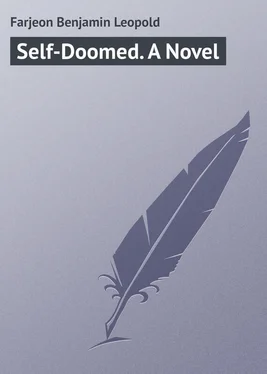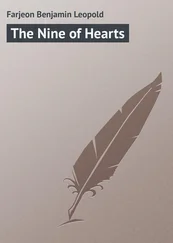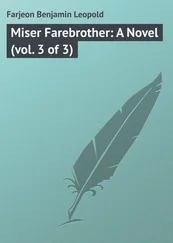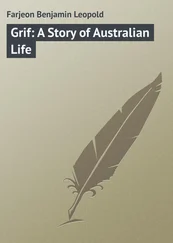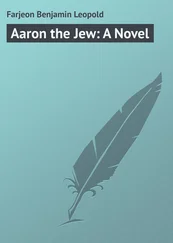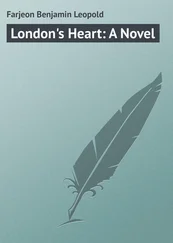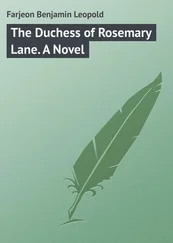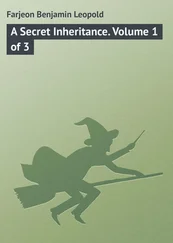Benjamin Farjeon - Self-Doomed. A Novel
Здесь есть возможность читать онлайн «Benjamin Farjeon - Self-Doomed. A Novel» — ознакомительный отрывок электронной книги совершенно бесплатно, а после прочтения отрывка купить полную версию. В некоторых случаях можно слушать аудио, скачать через торрент в формате fb2 и присутствует краткое содержание. Жанр: foreign_prose, foreign_language, на английском языке. Описание произведения, (предисловие) а так же отзывы посетителей доступны на портале библиотеки ЛибКат.
- Название:Self-Doomed. A Novel
- Автор:
- Жанр:
- Год:неизвестен
- ISBN:нет данных
- Рейтинг книги:3 / 5. Голосов: 1
-
Избранное:Добавить в избранное
- Отзывы:
-
Ваша оценка:
- 60
- 1
- 2
- 3
- 4
- 5
Self-Doomed. A Novel: краткое содержание, описание и аннотация
Предлагаем к чтению аннотацию, описание, краткое содержание или предисловие (зависит от того, что написал сам автор книги «Self-Doomed. A Novel»). Если вы не нашли необходимую информацию о книге — напишите в комментариях, мы постараемся отыскать её.
Self-Doomed. A Novel — читать онлайн ознакомительный отрывок
Ниже представлен текст книги, разбитый по страницам. Система сохранения места последней прочитанной страницы, позволяет с удобством читать онлайн бесплатно книгу «Self-Doomed. A Novel», без необходимости каждый раз заново искать на чём Вы остановились. Поставьте закладку, и сможете в любой момент перейти на страницу, на которой закончили чтение.
Интервал:
Закладка:
"Ah, what an adventure, Master Fink-what a sad, melancholy adventure!" he would say, bursting in upon me suddenly.
"What is the matter, now, Gideon?" I would ask, preparing for the shock.
"Oh, the world-the cruel, cruel world!" he would moan. "You know, Master Fink, that I went from here with three florins in my pocket, which I intended to pay Muller the tailor off the just debt I owe him."
"Proceed, Gideon."
"On the outskirts of the town I met a poor unfortunate woman-"
"On the outskirts of the town, Gideon? That is not the way to Muller's shop."
"Muller was not in when I called, so, the day being fine, I took a walk through the woods. Was it good or bad fortune, Master Fink, that the idea came into my head of walking through the woods?"
"Until you further enlighten me I cannot say."
"You shall hear all. In the woods I met this poor unfortunate woman. She had no shoes to her feet, and only a thin torn dress upon her body; and oh, Master Fink, she had a baby in her arms who was sobbing for want of food. The wretched creature told me her sad story, and begged me, if I had a mother of my own, to save her child from starvation. What could I do? I am poor-yes, I am poor, and the money in my pocket really belonged to Muller, but could I resist so heart-rending an appeal? Could you have resisted it? No, you are too humane, and because I am not rich, am I to be deprived of the pleasure of doing a good action? I did as you would have done. Without considering how I should replace the three florins I gave them to the poor woman, who crawled away, calling down blessings on my head."
"You want me to lend you three florins to pay Muller."
"Yes, Master Fink, to lend it, not to give it. You must not rob me of the pleasure of doing an act of charity."
To these and numberless other stories I would listen, without troubling myself to contradict him. What would have been the use? As long as I kept Gideon with me it was best not to come to words with him, and I bore with many things of which I did not approve. Occasionally I lent him a portion of what he asked for, taking care that he did not get too deeply in my debt, and I used to think with wonder of the amazing amount of deceit that could be hidden in the breast of one human being.
I see in your eyes the question, Why, if I did not like Gideon Wolf, did I continue to employ him? Why did I keep him, an indifferent workman, in my shop, when there were so many better men looking for work who would have been grateful to me all the days of their lives if I had taken them on? For it is not workmen that are difficult to find; it is masters. Well, there was a strong human reason, and I may speak of it now because it will hurt no one. It was not for the sake of Gideon Wolf, but for the sake of his mother, that I kept him with me.
Friend, I am going to open for you a chapter of my life which few have read.
CHAPTER II
A LOVE-CHAPTER IN THE LIFE OF MASTER FINK
The village in which I was born lies fifty miles from this spot, and is one of those places hidden in odd nooks and corners which the busy world seems either to have forgotten or to regard as of too slight importance to take any notice of. It moves neither backward nor forward; it is the same to-day as it was a hundred years ago. Its houses, its roads, its little shops, its bits of garden, its church, are the same now as then, and, unless something startling occurs, will be the same at the end of another hundred years. There are families living there at this moment whose great-great-grandfathers lived there-in the self-same cottages, grown now so old that their walls are rotting and crumbling away. The people, with scarcely an exception, are all of them poor, and live a life of contentment. As I should have done perhaps-my family for five generations having done so before me-had it not happened that I fell in love with Louisa Wagner.
I have spoken of the beauty of Katrine Loebeg. Louisa Wagner was even more beautiful. Do not think I say so because I loved her; it was universally acknowledged; and just in the way Katrine was sought after here so was Louisa sought after in the village in which I was born. I may say, without running the risk of being thought vain, that I was a well-looking lad. It is undoubtedly a fact that I was industrious, and not given to tippling. From my father I learned the mysteries of the art of watchmaking. Our family had been the village watch and clock menders for generations. There was, however, not enough business in that line to be picked up among the scanty and poor population to support us, so my grandfather, and my father after him, took to cobbling boots and shoes to eke out a living. I also learned to cobble, and was no mean hand at it. We were, therefore, the village watch-menders and cobblers, and managed to rub on, chiefly, it must be owned, by the patching of leather, which is a degree or two lower in the social scale than the art which teaches you how to put together the delicate works of a watch.
Louisa Wagner was the only child of a laborer on the private estate of the owner of the village lands, and in falling in love with her I fell in love with a girl in my own station in life.
Heavens! how beautiful she was! Her cheeks were handsomer than the handsomest peach, her eyes were as bright as the brightest stars, her skin was as soft as the softest velvet. To me what a vision of brightness! Where on this earth was to be found her equal? In my belief, nowhere. That is the way of lovers for a time. No feeling so potent as that which agitates the heart of a young man as he contemplates the being upon whom he has set his affections. Gradually the change comes, as we all live to learn. The heavenly light fades slowly away, and life's hard lessons, no less than the strange workings of the human heart, recall us to a sterner reality. Happy those who find themselves cast upon a peaceful shore, where they can enjoy the calmer and more enduring affection which sometimes follows the subsidence of love's delirium!
For weeks and weeks I nursed my passion, fed on it, was made happy by it. Louisa Wagner did not appear to look on me with coldness; nay, she seemed flattered by my ardent glances, and, as I believed, had a feeling stronger for me than that of ordinary friendship. That she should love me with such devotion as I loved her was not to be thought of. This love of a young man when it is pure, as mine was, ennobles him, and beautifies all surrounding things. I sang at my work, though it was even so mean as the patching of boots. Louisa had two pairs of boots, and I soled and heeled them, one after the other, and my heart went into the stitches. I held them in my hands and kissed them-yes, I am not ashamed to confess it, I kissed them in a kind of rapture. I took them to bed with me. By the side of my bed hung a cage with a linnet in it. I told the bird in a whisper that the boots belonged to Louisa-ah, what foolish, foolish things we do when the fever is upon us! – and the linnet trilled out its joyfullest notes. I laughed, I chirruped, I shed tears, and when I knelt at my bedside and repeated my prayers, I pressed Louisa's boots to my heart. Upon the soling and heeling of those boots I would have liked to challenge the world. Surely such excellent workmanship could not have been produced by other hands than mine. Louisa Wagner thought so, and said so, as she took them from me and examined them.
"You will see," I said, "they will last for years."
"They are beautifully done," she said, and I fancied she gave me an admiring glance; "such fine stitches! You are really clever."
"I can earn a living," I said, and my voice trembled because of the meaning I wished to convey in the words.
"But," she said, "I cannot pay you for them for a long, long while. You will have to wait."
Читать дальшеИнтервал:
Закладка:
Похожие книги на «Self-Doomed. A Novel»
Представляем Вашему вниманию похожие книги на «Self-Doomed. A Novel» списком для выбора. Мы отобрали схожую по названию и смыслу литературу в надежде предоставить читателям больше вариантов отыскать новые, интересные, ещё непрочитанные произведения.
Обсуждение, отзывы о книге «Self-Doomed. A Novel» и просто собственные мнения читателей. Оставьте ваши комментарии, напишите, что Вы думаете о произведении, его смысле или главных героях. Укажите что конкретно понравилось, а что нет, и почему Вы так считаете.
